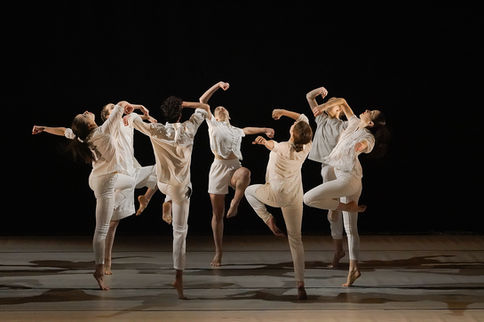
Dance
The dance major at Thelma Yellin has been training the best dancers and creators in Israel since 1985. In the dance major, we believe that professional dance training and education through dance do not have different goals but rather complementary arenas, and therefore we seek to emphasize the importance of dance for the personal growth of each student in the major, without sacrificing the essential cultivation of technical, expressive, and choreographic dance skills. Treating students as whole people is a necessary condition for their development as artists with a personal statement, and therefore students in the major are required to be prepared for a journey of self-exploration while eliminating old habits, a willingness to work hard and strenuously, physically and mentally, and an honest and ongoing dialogue with the teaching staff.
Ran Brown
Lecturer and dance critic at Haaretz newspaper. He began his professional career in a dance workshop run by Yehudit Arnon (Kibbutz Ga'aton), danced with the Moza dance company in Tel Aviv and in the works of independent choreographers. Graduate of the Interdisciplinary Arts Master's Program at Tel Aviv University and the Teacher Training Program (Bachelor's Degree in Education) at the Kibbutzim Seminar. After years of practical teaching of contemporary dance, in recent years he has focused on dance research and writing. Ran is the founder of the online journal Detour, and the editor of the book "A Place for Action: Contemporary Choreography in Theory and Practice."

Head of the major
Activities
Every year, students of the department perform excerpts from works by Israeli and international choreographers, both at the high school's annual arts festival and at national events outside of school. The dance department performs in a diverse program, in which students of the department dance classical, neo-classical, modern and contemporary repertoire, in addition to choreographies created by the students themselves.
.jpg)
Practical lessons, workshops and theory
The practical studies in the major include classical ballet, fingerwork, modern dance, contemporary dance, and composition. In addition, as part of repertoire classes, classical ballet and modern dance pieces are taught regularly throughout the year. In addition, master classes are held regularly: practical workshops with leading dance creators. The theoretical studies include classes in dance history, anatomy, music, and other topics.
.jpg)
10 study units
Activities in the program
A unique and diverse academic program for the dance major, including special events
Workshops
and master classes
Every year, we host choreographers and dancers from visiting companies in Israel in the dance department and hold workshops, master classes, and discussion sessions with them. In addition, students in the department are regularly exposed to local creations through performances, meetings, and regular classes.
Dance-place films
Each year, the dance and film majors come together to create a dance film (Video Dance). This is an experience in a collaborative creative process, in which students set out to produce, choreograph, dance, film, and edit location-specific short films.
The screening of the films takes place in a festive atmosphere attended by all students in both majors, teachers, the school principal, and guest artists from the fields of dance or film, who present their artistic work and respond to the films created by the students.
project
36
A unique artistic flash marathon in the field of dance, bringing together all students of the program to jointly create original works in just 36 hours. The project was created on the initiative of students, inspired by "Project 48 in Dance" under the artistic direction of choreographer Dana Rotenberg (a graduate of the program herself).
Students in the program organize, produce, create, and perform original works themselves, following artistic references they receive from their teaching staff. The project begins with a lottery in which the creative ensembles are selected, and 36 hours later the works are presented to an audience.
Afternoon classes
We recommend that students in the program participate in additional dance classes at a professional studio of their choice. In addition to the practical need during practice hours, we see great importance in getting to know other teachers and other methods. At Telma Yellin, the Israeli Ballet Studio operates in the afternoons, in full pedagogical and artistic cooperation with the dance program.
The team
12 teachers | 9 areas of specialization
The program's staff consists of some of the country's most prominent dancers and creators, teachers of classical ballet, contemporary dance, choreography, theory and music. They combine professional experience from the big stages with an educational approach that sees dance as a tool for personal and creative growth. Students in the program receive comprehensive training that includes ballet, modern, floor work, improvisation, choreography and theory, while encouraging self-exploration, in-depth physical and mental work and ongoing dialogue with the team.
Lisa Manich
Classical ballet
Sivan Blitzova-Barkai
Fingers and classical repertoire
Sharon Vazanna
Contemporary dance
Katya Barachov
Classical ballet
Dina Ziv
Floor work
Odelia Kupferberg
choreography
Amit Yardeni
Ballet class
Noa Shador
improvisation
Ran Brown
History and theory of dance
Debbie Vanhon
Classical ballet
Dana Zacharias
Modern dance
Avner Hanani
music
Admission conditions
Students in the program are examined each year by the program staff and receive ongoing feedback on their practical work.
At the end of school, in the twelfth grade, a matriculation exam is administered before external examiners and includes practical tests in classical ballet, modern dance, and composition.
Studies in the major provide five matriculation units in dance, which consist of practical studies and theoretical studies (music for dance, anatomy, and dance history).
Students in the program are given the opportunity to expand their studies to a matriculation recital with five additional units.
The admission stages include a practical exam, interview, and medical examination as detailed below:
Events


.jpg)


















































.jpg)







